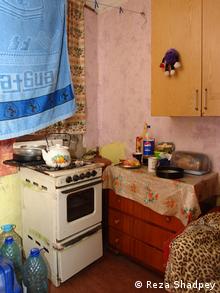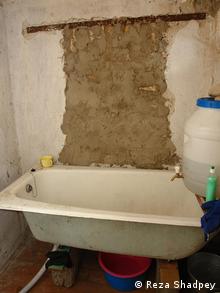
عکاس و خبرنگار، نوكیشان مسیحی، و سیاسیون پناهجویان ایرانیای هستند که در اوکراین تقاضای پناهندگی دادهاند. جایی که میخواستند سکوی پرش آنها به اروپا باشد .
ترکیه از دیرباز، یونان، قبرس، مالزی و به تازگی جمهوری آذربایجان و حالا اوکراین. این کشورها سکوی پرش پناهجویان ایرانی به سوی اروپا و آمریکا هستند.
«محبت نیوز» - "رضا شادپی"، ۳۵ ساله و متاهل، عکاس، وبلاگنویس و طراح وب بیش از دو سال است که در اوکراین تقاضای پناهندگی داده است. دفتر سازمان ملل در کیف پناهندگی او را پذیرفته اما هنوز به یک کشور ثالث فرستاده نشده است. ۱۳ آوریل یعنی حدود سه هفته دیگر مهلت اقامتش در اوکراین تمام میشود و او باید خاک آن کشور را ترک کند.
حالا مانده بدون چاره. میگوید تنها نیست. حدود پنجاه ایرانی دیگر در شرایطی به گفتهی او بدتر از موقعیت این عکاس، هریک بین ۸ تا ۱۰ سال است که در کیف بلاتکلیفاند. یکی از آنها نگهبان یک ساختمان در حال ساخت است و در سرمای ۲۵ درجه زیر صفر شب های کیف در یکی از اتاقکهای این ساختمان نیمهکاره میخوابد. چند نفر دیگر نیز که از اسلام به مسیحیت گرویدهاند شب ها را در کلیسا میگذرانند.
چرا اوکراین؟ رضا معینی مسئول بخش ایران سازمان گزارشگران بدون مرز به دویچهوله میگوید: «کیف سرپل ورود به اروپاست. از سوی دیگر تعداد دانشجویان ایرانی رشته پزشکی و دندانپزشکی در آنجا بسیار زیاد است. بسیاری از همین دانشجویان پس از پایان تحصیلات تقاضای پناهندگی میدهند. به همین دلیل هم تعداد پناهجویان ایرانی در اوکراین نسبتا زیاد است».
پیدا کردن کشور ثالث: معضل بعد از پناهندگی
رضا شادپی میگوید رفتار پرسنل سازمان ملل در کیف با پناهجویان بسیار بد است. او همچنین میگوید بعد از پذیرفته شدن تقاضای پناهندگی از سوی سازمان ملل هم شرایط هیچ تغییری نمیکند و فرستادن به کشور ثالث گاه چندین سال طول میکشد.
رضا معینی میگوید مسئله پیدا کردن یک کشور ثالث در برخی از کشورها مثل اوکراین و ارمنستان یک معضل برای سازمان ملل است چرا که این کشورها از نظر قوانین حقوق پناهندگی نه اروپا محسوب میشوند و نه آسیا.
بر اساس کنوانسیون دوبلین، هر کشور اروپایی ملزم است بررسی کند پناهجویی که از یکی از کشورهای عضو تقاضای پناهندگی کرده از کدام مرز وارد اروپا شده است و اگر این مرز با مکان درخواست پناهندگی مغایرت داشت، مجددن او را به کشور اولیه بازگرداند.
بنا بر این قانون، کسانی که در اوکراین یا ارمنستان پناهندگی گرفتهاند برای رفتن به یک کشور اروپایی دیگر دچار مشکل میشوند.
به گفتهی آقای معینی در ماه نوامبر ۲۰۱۱ به علت مشکلات اقتصادی و اجتماعی که یونان دچار آنهاست، دادگاه عالی اروپا رای بر این داد که پناهندگان یونان میتوانند به کشورهای دیگر اروپایی منتقل شوند. او میگوید با تکیه بر این رویه قضایی، کشورهایی مثل اوکراین و ارمنستان هم میتوانند پناهندگان را به کشورهای دیگر اروپا بفرستند.
سازمان مللی که دولتی است
رضا شادپی میگوید سازمان ملل تقاضای پناهندگی او را پذیرفته اما دولت اوکراین به او اقامت نمیدهد. اجازه رفتن به کشور دیگر هم هنوز برایش صادر نشده است.
رضا معینی میگوید مشکل دیگر کشورهایی مثل اوکراین و حتی ترکیه این است که دفتر سازمان ملل در این کشورها یک نهاد ملی است و تحت کنترل دولت است، بنابراین دفتر پناهندگی سازمان ملل نمیتواند مستقل از دولت اقدامی برای پناهندگان انجام دهد.
و این دقیقن همان شرایطی است که پناهندگان افغان و عراقی در ایران دارند یعنی پناهندگی را از سازمان ملل میگیرند اما اجازه اقامت را وزارت کشور ایران باید برایشان صادر کند.
"رضا شادپی"، ۳۵ ساله و متاهل، عکاس، وبلاگنویس و طراح وب سه هفته مهلت دارد تا یا از اوکراین خارج شود یا اجازه اقامت در این کشور را بگیرد. او واهمه دارد از این که به ایران بازگردانده شود. جایی که به گفتهی او کمترین مجازاتش چندین سال زندان خواهد بود.
خبرگزاری آلمان










